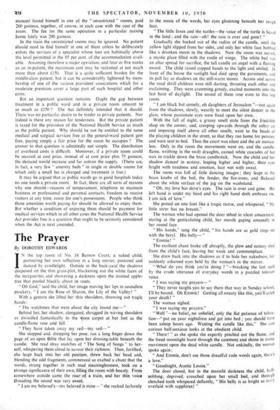The Prayer
By DOROTHY EDWARDS
IN the top room of No. 14 Barrow Court, a naked child, partnering her own reflection in a long mirror, postured and danced by candlelight. Outside in the back-yard the shadows deepened on the thin grass-plot, blackening out the white faces of the marguerites and showering a darkness upon the stunted apple- tree that pooled blackly about its roots.
"Oh God," said the child, her image moving her lips in soundless mockery, "I am the Rose of Sharon, the Lily of the Valley! " With a gesture she lifted her thin Shoulders, throwing out tragic hands: , "The watchmen that went about the city found me—" Behind her, her shadow, elongated, shrugged its waving shoulders or dwindled _fantastically to the Iforn carpet at her feet as the candle-flame rose and fell.
"They have taken away my veil—my veil—"
She stopped and, dropping her pose, ran a long finger down the page of an open Bible that lay upon her dressing-table beneath the candle. She read stray snatches of "The Song of Songs " to her- self, whispering' them aloud to savour their richness. Then, fortified, she leapt back into her old position, threw back her head and, blending the odd fragments, commenced1 so exalted a chant that the words, strung together in such mad meaninglessness, took on a strange significance of their own, filling the room with beauty. From somewhere outside came. the roar of a train, and her thin voice threading the sound was very sweet.
"I am my beloved's—my beloved is mine—" she rocked forlornly
to the music of the words, her eyes glistening beneath her rough
hair. , • • "The little foxes and the turtles—the voice of the turtle is heard in the land ; and the rain—oh! the' rain is over and gone! "
Gradually, she backed out of the radius of the candle, until the yellow light slipped from her sides, and only her white face bobbed like a drunken moon in the shadows. Now the room was sacred, a mystic place filled with the rustle of wings. The white bed was an altar spread for sacrifice, the tall candle an' angel with a flaming sword. The child raised cupped hands to the light and smiled. In front of the house the sunlight had died upsp the pavements, and its pall lay as shadows on the still-warm stones. Across and across the road shrill children were still darting, thrusting each other and exclaiming. They were cramming greedy, excited moments into the last hour of daylight. The sound of them rose even to this top
room. .
"I am black but comely, oh daughters of Jerusalem "—out again from the shadows, slowly, wearily to meet the silent dancer in the glass, whose passionate eyes were fixed upon her own.
With the fall of night, a greasy smell stole from the fried-fish shop on the corner, and, creeping upwards through the sultry air and imposing itself above all other smells, went to the heads of the playing children in the street, so that they ran home for pennies, and were sent to bed. Then the court was silent and the air motion- less. Only in the room the movements went on, and the candle- flame, writhing in the swift draughts, caused white cascades of hot wax to trickle down the brass candlestick. Now the child and her shadow danced in ecstasy, leaping higher and higher, their eyes bright with tiredness and emotion, hair wet with sweat.
The room was full of little dancing images ; they leapt in the brass knobs of the bed, the fender, the fire-irons, and flickered about the white surface of the jug on the washstand.
"Oh, my love has dove's eyes. The rain is over and gone. His left hand is under my head and his right hand doth embrace me. I am sick of love."
She poised on one foot like a tragic statue, and whispered, "My little sister has no breasts."
The woman who had opened the door stood in silent amazement, staring at the gesticulating child, her mouth gaping amazedly in her round face.
"His hands," sang the child, "his hands are as gold rings set with the beryl. His belly—"
"Emmie! "
The exultant chant broke off abruptly, the glow and ecstasy died from the child's face,. leaving her weak and commonplace.
She drew back into the shadows as if to hide her nakedness, her suddenly ashamed eyes held by the woman's in the mirror.
"What, do you think you're doing "—breaking the last spell by the crude utterance of everyday words in a puzzled tolerant voice.
"I was saying my prayers—"
"They never taught, you to say them that way in _Sunday school, I'll-be bound. Oh Emmie! Getting all sweaty like this, you'll catch your death! "
The woman sighed.
"I was saying my prayers."
"Well "—no belief, no unbelief, only the flat patience of tolera- tion—" put on your nightdress and get into bed ; you should have been asleep hours ago. Wasting the candle like this." She cast curious half-anxious looks at the obedient child.
"There! " as she spoke she expertly pinched out the flame, and the freed moonlight burst through the casement and shone in ironic merriment upon the dead white candle. Not unkindly, the woman spoke again: "And Emmie, don't use those dreadful rude words again, there s a love."
"Goodnight, Auntie Louise."
The door closed, but in the moonlit darkness the child, half sobbing, deprived, crouched upon her small bed, and through clenched teeth whispered defiantly, "His belly is as bright as ivory overlaid with sapphires! "


















































 Previous page
Previous page